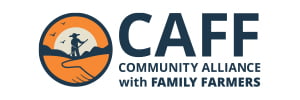Sacramento, CA – Earlier today, Governor Gavin Newsom announced a plan to prohibit use of the contentious pesticide chlorpyrifos and make significant investments in more sustainable pest management alternatives.
The one-time $5.7 million investment will accelerate the state’s investment in green pest management, including convening a new inter-agency body staffed by issue experts to develop a new framework for the state.
Paul Towers, Executive Director of the Community Alliance with Family Farmers (CAFF) & The Farmers Guild, issued the following statement:
“With climate change and global trade, the spread of pests presents an ever-growing threat to California farmers. The Newsom Administration’s proposal takes that challenge head-on.”
“Significant and meaningful investments in cutting-edge and sustainable pesticide alternatives offer not only an opportunity for family farmers to find common sense solutions to pest problems, but also a chance for California to make investments in farm communities and our economy.”
While some farmers may be concerned about losing a tool they’ve relied on to combat serious pest pressures, luckily organic farmers here in California have spent decades perfecting techniques without the need for chlorpyrifos (which is not allowed under organics). “On our citrus orchard we have been able to achieve high yields and delicious fruit without the use of Chlorpyrifos since 1985,” says Judith Redmond of Fully Belly Farm in the Capay Valley. “Because of the overwhelming evidence of human health impacts, including impaired brain development in children, our 400-acre farm supports the decision to search for alternatives to this chemical.”
Twenty five years ago, CAFF and the University of California worked together to show that by taking a biologically integrated systems approach to field and orchard management — including field scouting for pests, connections to UC expertise, and farmer-to-farmer learning — farms could be made more resilient and pesticides reduced.
###
Press contact: Evan Wiig, evan@caff.org

